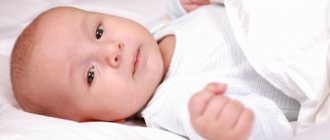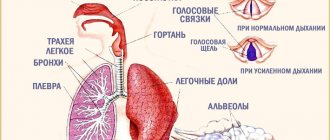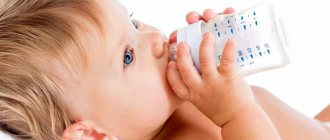At different ages, children may experience rare urination, and parents begin to sound the alarm: what’s wrong with the baby? Most often, panic turns out to be completely in vain: a small organism can simply adapt to a new age regime, because it grows, its food becomes more solid - accordingly, the number of urinations per day becomes less.
But sometimes there are cases when the cause of this phenomenon is a serious pathology of the urinary system, which requires long-term treatment. Therefore, first of all, you need to find out what factor caused the decrease in urine output per day.
Main reasons
There are various reasons for infrequent urination. To begin with, it is worth analyzing various factors.
- The baby may be wearing clothes that are too warm or be in a room that is too warm. With loose stools, the child also produces little urine;
- Changing the feeding regimen helps solve the problem. This is especially true for artificial children
.
If the baby is fed formula, then it is necessary to give him clean water to drink, in addition to his usual food. He doesn't pee much due to lack of fluids; - When switching from breast milk to artificial nutrition or when starting complementary feeding, urination problems often occur. There is nothing terrible here - the body simply adapts to digesting other food
. The child may write rarely or intermittently; - In hot weather, a newborn baby receives little fluid. Don't forget about clean drinking water;
- A similar problem can be caused by giving up diapers.
If these reasons are excluded, then it is better to consult a pediatrician to determine the exact cause.
Urination at night
Parents often note that the child does not pee at night in his sleep. This happens due to lack of milk
.
If the baby receives sufficient nutrition, then he is vigorous, active, grows quickly and gains weight
. Often, the lack of urination at night when the child is sleeping is associated with a small amount of food.
Ambient temperature affects urination during sleep. That is, if the house is hot when the child is sleeping, then the liquid may come out with sweat, and the baby will not pee in his sleep at night
.
The baby just needs to be given more water. If the baby is fed breast milk, then it should be applied to the breast more often
. For sleep, you need to choose light clothes made from natural fabrics.
A baby may not write enough at night in his sleep while weaning him off diapers. Rarely does such a problem arise from an abundance of salty foods during the day.
There are cases when a baby does not pee at night in his sleep due to dehydration due to illness. In such situations, you should immediately contact your pediatrician and treat the disease.
Prevention measures
Since impaired diuresis occurs most often for physiological reasons, this condition can be prevented by following simple rules.
It is necessary to constantly monitor the child’s drinking regime and teach him to drink clean, still water.
To prevent rare urination in a baby, parents need to closely monitor his condition:
- if baby food is replaced and urination decreases, you should change the formula and consult a pediatrician;
- observe the drinking regime - drink enough water: breastfed children up to 6 months have enough liquid in their mother’s milk, but in hot weather you can give additional water, and formula-fed babies simply need it;
- a nursing mother should adhere to a special diet so that the fat content of her milk does not suffer;
- introduce complementary foods in small volumes and one product at a time, according to the recommendations of the pediatrician and WHO;
- in the summer when it’s hot, you need to give your baby a lot of water and on demand, always take a bottle with you on a walk or to the clinic;
- carry out all necessary hygiene procedures on time;
- the baby may refuse to drink when he doesn’t like the sippy cup or bottle, in which case you should choose a different container;
- when teaching a potty, you should not put pressure on your child, force him to go to him, it is better to buy one that he likes together (we recommend reading:);
- for respiratory and intestinal diseases, give enough fluid, apply it to the chest more often to avoid dehydration;
- contact a pediatrician in a timely manner and treat infectious diseases, especially severe ones (flu, sore throat, etc.);
- Take medications only as prescribed by a doctor, read the instructions carefully before use.
A baby's body never works like a clock. And what is the norm for some seems completely wrong to others. There is no point in trying to fit a child into a framework and worrying about his “non-standard” behavior. If doubts and concerns arise, you can always get competent advice from a pediatrician. Many mothers feel that their baby is not peeing enough and this raises a real concern. In fact, it turns out that the child’s body is absolutely healthy and such urination is normal for him. In any case, if there is cause for concern, then you should dispel them by talking with a professional in your field.
What you should pay attention to?
You need to monitor your baby's urination regularly. If you notice delays when your baby sleeps or too little urine, you should check for other symptoms:
- Heat. A temperature above 36.8˚С is already a cause for alarm;
- The appearance of increased moodiness, drowsiness, lethargy;
- Dark colored urine when drinking enough;
- The child cries when peeing or straining;
- The appearance of swelling on the face, under the eyes;
- The child pees with blood.
Before starting any treatment, it is necessary to conduct an examination of the body. Almost any disease of the urinary system can be diagnosed using a urine test
. For a more in-depth examination, an ultrasound of the genitourinary system or an X-ray examination is prescribed.
Possible diseases
We will also consider diseases that cause a baby to pee a little:
- Kidney problems. The kidneys are a kind of fluid filter in the body; if their functioning begins to “fail,” very little urine is produced;
- Infection. It can occur in a person of any age, but children under three years of age are most susceptible to it. This leads to impaired urination and the main reason why the baby does not pee at night in his sleep, strains when urinating, or urinates intermittently;
- Formation of sand or stones in the urinary system;
- Pinching of the urethra;
- Unfavorable psychological atmosphere for the child, leading to constant nervous tension;
- Overdose of diuretics. It occurs as a consequence after or during treatment for other diseases.
Phimosis
Phimosis is a common disease in infant boys. It consists in narrowing the foreskin of the penis
. This disease can be congenital (in most cases) or acquired.
Treatment is individual in each case. In some children, the disease goes away on its own over time, within a few months, while others require surgical intervention.
. In any case, with the initial symptoms of such a disease, you should immediately contact your pediatrician. The main signs of phimosis:
- the child cries while peeing;
- the baby pees rarely, in a thin stream;
- pees intermittently;
- does not pee when sleeping;
- straining while urinating.
If you assume such a diagnosis, you should not self-medicate.
Therapy at home
It is immediately worth noting that self-medication should be treated very carefully. First, you should undergo an examination and still rule out various diseases of the urinary system. We will describe the main methods of treating infrequent urination at home.
Warm bath
It is better to take a bath while sitting. It is recommended to start at 27°C and then increase
.
Swimming should be done at the same time every day
. This procedure mainly helps with inflammation.
Compress
Just like a bath, they are recommended for inflammatory processes. They are done either in the bladder area, in the lower abdomen, or on the whole body. You can do them when the baby is sleeping
.
It is better to consult a specialist.
Proper nutrition
Urination directly depends on the baby's nutrition. It is necessary to exclude all experiments with complementary feeding, give the child enough liquid
. Especially during the first months of life.
Douching
Procedure prescribed by a pediatrician! Used when urination is accompanied by cutting pain.
Most importantly, parents always need to remember that the health of their baby is entirely in their hands. A newborn baby requires special attention and proper care.
He cannot talk about his problems and worries, so it is necessary to control the slightest changes in his behavior, actions, the appearance of whims, and bad mood.
Often, the disease is easier to prevent in the early stages than to treat for a long time. Do not waste time; if you find any problems, contact the hospital. The most important thing is a healthy baby!
Not very abundant or infrequent urination in a child can be observed at any age. Considering the fact that the norms for this indicator change as the baby grows older, parents should familiarize themselves with the basic figures in advance. If it seems to the mother that her little one has begun to urinate little or rarely, you should not take rash independent actions, you should immediately consult a doctor and take all the necessary tests to make a diagnosis.
Only with the permission of a specialist can you use folk diuretics and even adjust the baby’s diet. According to statistics, all worries in most cases turn out to be in vain, or the condition requires only minor intervention.
Age norms for daily and one-time volume of urine excreted, number of urinations
Before you go to the doctor, you need to take into account an important circumstance. Mothers often feel that the child has begun to write little compared to several weeks or months ago.
. In fact, this may simply be a consequence of age-related changes. Parents should stock up on a memo that indicates how many times a day at what age the baby should relieve himself, and what the normal single and daily volumes of urine are.
- From birth to six months of life. A newborn baby is able to pee up to 20-25 times a day, releasing 20-35 ml of fluid at a time. On average, they excrete up to 400-500 ml of urine per day.
- From six months to a year. The number of urinations is reduced to 15-17 per day
. The one-time volume increases by approximately 5-10 ml, the daily volume - by 100 ml. - Up to three years. The number of “approaches” is already 10-12 times. During one urination, the child excretes about 60-90 ml of the product, per day - 700-800 ml.
- Up to seven years old. The number of urinations is no more than 7-9. But, if up to five years of age, 70-90 ml of liquid is removed from the child’s body at a time, then in the next two years the one-time volume is already 100-150 ml
. It turns out that up to five years the daily volume of urine is 900-1100 ml, after that – 1100-1300 ml. - Up to nine years old. With the same number of urinations, the one-time volume increases by 50 ml, the daily volume - by 200 ml.
- Up to 13 years old. Children go to the toilet little by little up to 6-7 times a day. The single volume of fluid released is close to 250 ml, the daily volume is 1800-1900 ml.
It should be taken into account that the instructions contain average indicators. Data in each specific case may shift slightly in one direction or another depending on the characteristics of the child’s development, activity and nutrition.
How many times should a child write a day?
There is no clear data on how much a child should urinate per day. In response to your complaint that your child rarely goes to the toilet, the pediatrician can only advise you to monitor the amount of fluid intake. But let's speculate based on real observations of children
From birth, the baby pees often (on average 20-24 times a day); there are rarely cases when a newborn remains dry all night from the first days. At 1-1.5 years, the capacity of the bladder increases, and the baby can remain dry for two hours. During this same period, the baby may remain dry all night due to the fact that the filling of the bladder slows down. Therefore, if the baby goes to bed at 21:00 and gets up at 7:00 in the morning, then on average the child goes to the toilet 8 times per day.
At 3.5-5 years old, a child can tolerate 3-5 hours without a potty, then with this regime he can go to the toilet 3-5 times a day. But these data are purely theoretical, since you need to look at fluid consumption. If you think that your child does not go to the toilet well, then you need to monitor how much water, tea, compote, fruit juice, milk, and liquid from first courses he consumes per day.
For example, in maternity hospitals, children are allowed to drink boiled water 1-2 times a day (no more than 30 ml) between feedings. Pediatricians also say to give water to a child up to a year 1-2 times a day (no more than 60 ml), especially during periods of illness or heat. But one child can drink water with great pleasure, while another prefers to drink a liter of milk per day.
In summer or in a stuffy room, children drink more often and more, and in winter or in a ventilated, humidified room, accordingly, the volume of liquid they drink is less. In this case, of course, there is no reason to worry if the child does not go to the toilet very often. That's why moms should monitor their fluid intake before panicking at the pediatrician's office.
The main physiological reasons for infrequent urination and methods of assistance
In cases where a child begins to write little, it is first necessary to consider the possibility of exposure to physiological factors:
- The child is not eating properly. In the case of an infant, this may be the result of non-compliance with the postpartum diet by the nursing mother
. Often, a baby begins to pee less than usual when switching from natural feeding to mixed or artificial feeding. - The drinking regime is not observed. The specificity of a child’s body is such that it does not always give signals in the form of thirst, indicating a lack of fluid
. An adult should monitor how much water the child receives per day and, if necessary, replenish these supplies. - Fluid leaves the body in a different way. During the summer heat, with increased activity of the child, with vomiting or diarrhea, there is simply no liquid left for the formation of urine.
If the likelihood of these causes being influenced is very low, you need to visit a doctor who will conduct the necessary studies and determine why the baby urinates little or rarely.
How much do babies pee?
Not a single pediatrician can develop an exact formula for how much babies pee. Babies are individual and the characteristics of their body cannot be measured. And if a newborn baby pees very often, then as the baby grows up he begins to change his habits.
Very often, a baby pees little due to low fluid intake. As a result, he simply has nothing to urinate with. Therefore, he can prescribe literally a few drops per hour and for him this will be the norm. If you adhere to the opinion of doctors, then infants in the first year of life should ideally prescribe at least 70% of the total amount of fluid consumed. Particularly zealous mothers can take measurements in person. Within one day, it is necessary to accurately measure how much liquid the child consumed and how much was excreted during urination. It is problematic to make such measurements if the baby is breastfed.
If there is concern that the baby is peeing little, and his appearance and physical condition have not changed at all, then there is no need to worry. In cases where the baby is swollen, the arms and legs are filled with fluid, and bags have appeared under the eyes, then in this case there is no way to do without a visit to the pediatrician. The doctor will tell you how much babies pee, help you take measurements, and possibly make a diagnosis as to why fluid retention occurs in the child’s body.
There is no clear answer to this question. There are many reasons why babies pee little. The main ones include:
- Individual characteristics of the body.
- Low fluid intake.
- Replacing breastfeeding with artificial feeding.
- Potty training your baby.
- Introduction of new food products.
- Hot weather and increased sweating of the baby.
- Growing up.
- Weaning a child off the bottle.
- Congenital diseases.
The latter factor causes rare urination in extreme cases. Most often, a baby pees little due to a change in diet or weather conditions. In some cases, children express a kind of protest in this way. If there is active learning and accustoming to something new that the child does not like, then he may go to the toilet less often, eat less, or show his indignation in other ways.
If you want to find out why your baby pees little, you should carefully observe his behavior. Some recently acquired habits can explain many of the features of his rare urination and will save his mother from unnecessary worries.
The baby pees little in the heat
This behavior of a child should not cause absolutely any concern. If a baby pees little in the heat, this is normal. A significant amount of fluid comes out with sweat. As a result, the previous active urination is replaced by periods of absence of the urge to go to the toilet. If necessary and if the child wants it, an enhanced drinking regime can be introduced. It is very important to give your baby enough water from the first days. No matter what type of feeding he is on, there will never be excess water. It is necessary to replenish fluid loss correctly. And if a child greedily reaches for a bottle of water, then this means that the parents are on the right track. In any case, when a baby pees little in the heat, this is normal.
Baby doesn't pee at night
This situation occurs quite rarely and most often occurs during periods of weaning him off diapers. The baby does not pee at night due to the fact that he has begun to develop the concept that it is preferable to go to the potty rather than in diapers. In rare cases, a similar situation occurs when the baby has eaten something salty and experiences fluid retention in the body. In the morning, he may experience slight swelling. But such a manifestation of the body is not the norm for him. If the child’s condition is of concern, then a visit to the pediatrician is mandatory.
The baby pees little for various reasons. Most of them do not cause any concern and are simply individual reactions of the baby’s body to various external factors. Only in cases where the child’s appearance and general condition deteriorate, should you consult a doctor and begin systematic treatment of the child.
From the first days of the baby, pediatricians draw the attention of the young mother to the fact that it is important to control the amount of liquid and food consumed, the color of urine and feces. Therefore, when a child goes to the toilet little or, conversely, too often, it is necessary to find out the reasons for this behavior and, if possible, consult a doctor.
Possible pathological factors provoking the condition
All pathological causes can be divided into two large groups: in some cases, urine is not formed, in others it accumulates in the bladder, but does not come out. This is a consequence of the following factors:
- Kidney disease, which causes tissues to lose their ability to produce urine.
- Partial or complete blockage of the ureters (stones, sand in the kidneys or bladder).
- Problems with the bladder due to prolonged refusal to empty it (for example, excessive distension).
- Incorrect or prolonged use of diuretics.
- Psychological discomfort, hysteria, nervous breakdown.
Advice: Changes in the frequency and quality of urination are often observed in children who find themselves in a new environment (kindergarten, school). In some cases, due to the child’s shyness, in others, due to improper behavior of the staff, the baby stops writing as needed.
.
He begins to tolerate it, which quickly becomes a habit
. Sometimes a simple conversation is enough to discover this reason.
- Neoplasms in the ureters and blood vessels.
- Consequences of spinal or brain injuries.
- Infectious processes in the genitourinary system.
The listed conditions are not diagnosed by eye. Even an experienced doctor must first conduct a series of studies. Parents should pay attention to the presence of symptoms characteristic of problems in this area.
Symptoms of pathology and tests that need to be taken if problems are suspected
In cases where a child pees a little, but no additional signs of pathology are observed, physiological reasons are most often to blame for the condition. You should think about problems if the following symptoms occur against the background of retention or insufficient amount of urine:
- Urine is released in drops or a very thin intermittent stream.
- A child may not write all day, and the process becomes possible only when his body is given a certain position.
- A newborn cries while passing urine, and an older baby complains of burning or soreness.
- There is an increase in body temperature, even a slight one.
- The baby's behavior changes. He becomes moody, lethargic, drowsy.
- The color or smell of urine changes significantly.
- After sleep, no matter how long it lasts, the baby develops swelling on the face.
The process of diagnosing the condition begins with a general urine test. For the purpose of a more detailed examination, urine tests are often prescribed using the Nechiporenko or Zemnitsky method, ultrasound of the excretory organs, and x-rays of the urinary ducts using a contrast agent. Only after it becomes obvious why the child’s body retains or does not produce urine, therapeutic manipulations and medications are introduced.
What warning signs should you look out for?
Characteristic changes in the child’s condition and behavior cannot be ignored:
- urine is released in droplets, very weakly, intermittently;
- urination causes pain to the baby, he complains of pain and burning, cries;
- to relieve himself, the child takes an unnatural position;
- the baby does not pee at night, the next morning the diaper is empty;
- The baby can endure and not go to the toilet all day.
These symptoms should seriously alert parents. If they occur, you should immediately seek medical help, especially if we are talking about an infant.
You should also call a doctor immediately if there are signs of inflammation:
- increased body temperature;
- general state of lethargy, weakness;
- urine has changed color or smell, there is an admixture of blood;
- swelling after sleep;
- urination causes pain.
Home Treatment Options
In cases where the diagnosis allows us to exclude pathological processes, doctors recommend ensuring that the baby does not have a large amount of salty foods in his diet. Both newborns and adolescents should receive sufficient fluids per day
. Its volume must be increased as the child’s activity or ambient temperature increases.
If the cause of the phenomenon turns out to be a pathological process, the approach to each child should be selected individually. Most often, in case of problems with the passage of urine in a normal volume or with the required frequency, the following manipulations are used:
- Sitz baths. Initially, cool water is used, then the temperature gradually rises.
- Compresses. Most often these are soothing compresses on the bladder area, but treatment of larger areas is also allowed.
- Medical nutrition. Food prepared for a child should not irritate the walls of the stomach.
- Douching. Used as an auxiliary method for painful emptying of the bladder.
Medications are prescribed only by a doctor. You should not hope that the baby will begin to write as it should if you give him a diuretic. Such actions can significantly complicate the situation.
Read the article on how to treat erythema toxicum in newborns
Violation of the frequency of urination can be either a variant of the norm or a sign of various urological diseases. Laboratory tests and specialist consultation are required to clarify all the details of the situation. In accordance with the results of a comprehensive examination, the necessary examination may be prescribed.
Treatment Options
Therapeutic actions should be taken only after the recommendation of a doctor. Self-medication in relation to children can lead to dire consequences.
You cannot give your child any medications or use traditional methods of treatment. Taking diuretics is contraindicated, because they will only aggravate the course of the disease and blur the clinical picture of the disease.
The first step should be to visit a pediatric nephrologist or urologist. Depending on the diagnosis, medications are prescribed. They should be taken in strict accordance with the doctor's recommendation. For inflammation, antibiotic therapy is indicated. The choice of drug is made depending on the causative agent of the disease.
Often, a specialist recommends sitz baths for 15 minutes, in which the water temperature gradually increases from 26 to 30C. Therapeutic compresses on the bladder area help well. Be sure to follow a salt-free diet - it is known that salt can retain fluid in the body.
If the child cannot relieve himself, a catheter is placed and douching is done. In case of significant dehydration, droppers are indicated. The procedures are best performed in a hospital setting. Dehydration is especially dangerous for young children, and in some cases it can even be life-threatening. If the doctor finds stones or sand in the urinary system or other serious pathologies, surgical intervention may be indicated for the young patient.
Rare urination due to improper care can be quickly eliminated:
- when changing baby food (switching to a new formula, introducing complementary foods), it is advisable to consult your local pediatrician;
- follow the doctor’s recommendations when introducing new products into the diet, give them one name at a time in small portions, monitor the baby’s reaction;
- give the child enough liquid (especially in summer); for older children, water should be available at all times;
- For infants, completely exclude salt from the diet; for older children, give it in limited quantities;
- breastfeed the baby on demand, in hot weather and for colds, offer water at least 2-3 times a day;
- maintain hygiene, wash the child after each urination and before bed, change diapers more often;
- do not take any medications without a doctor’s recommendation;
- do not insist on using the potty if the child does not want it, teach it gradually and without negative emotions.
If you notice that a baby under one year old urinates little, you should not sound the alarm ahead of time; it is better to reconsider the child’s lifestyle. This condition in children is often caused by eating disorders, psycho-emotional shocks or pedagogical errors. In other cases, it may be a sign of serious kidney disease or a developmental disorder.
Children under one year of age need to be given special attention, because, unlike older adults, they cannot complain of pain and report discomfort by screaming and crying. This behavior cannot be attributed only to banal colic or teething; one should always understand the cause of the concern. Otherwise, you may miss the first symptoms of a serious illness.
If your baby pees little and rarely, you should consult your pediatrician.
Reasons for the situation
The main key to solving the problem of infrequent urination is to find out the cause. Often, correction of the drinking regime and diet, and more careful care of the child almost instantly eliminate the problem.
On the other hand, knowledge of the causes of the disease helps to correctly influence them or radically eliminate them, that is, to prevent the development of the disease or its transition to a chronic form.
The causes of infrequent urination are different for babies and older children. A small (infant) child pees little as a result of the following points:
- transition from full breastfeeding to mixed or artificial breastfeeding;
- insufficient volume of fluid consumed, especially in the hot season;
- transition from drinking from a bottle to a baby cup;
- refusal to use modern diapers (so-called “pampers”).
Rare urination in an older child, who already clearly understands and exercises control over his own excretory functions, is caused by the following situations:
- various types of psychological discomfort (reluctance to show intimate parts of the body to other people, for example, at school; lack of proper sanitary and hygienic conditions in public toilets, a false sense of something shameful in natural practices in the appropriate environment in a children's group);
- insufficient fluid intake or inconsistency with physical activity;
- urological diseases themselves.
Thus, in this situation, there are 2 main possible reasons for rare urination in children:
- producing insufficient urine;
- production of a sufficient amount of urine, but it is retained in the bladder or other parts of the urinary tract.
It is important to understand that it is possible to thoroughly and definitively understand the causes of rare urination only with the help of a specialist. Any independent attempts at treatment can lead to a worsening of the condition and provoke irreversible disorders of the urinary system.
Why did the child begin to write little?
A small volume of urine excreted may be due to physiological reasons that are easily corrected. These are the ones that parents who are concerned about their child’s condition should pay attention to. If the measures taken do not produce results, and the baby’s health deteriorates, you should immediately seek advice from a specialist.
Physiological reasons for infrequent urination
Natural, physiological causes of rare urination include:
- ending breastfeeding and receiving formula;
- a small amount of milk from the mother or insufficient fat content;
- non-compliance with diet by a nursing mother;
- receiving complementary foods;
- drinking insufficient amounts of liquid;
- hot weather conditions or overheating of the baby;
- Diaper refusal and potty training;
- changing your usual lifestyle (starting to attend kindergarten or school).
A child in the first months of life is not able to signal thirst, so parents should offer him water during the day. Breastfed babies are given breastfeeding on demand. Modern experts are of the opinion that feeding by the hour is harmful to the child’s body, because in addition to nutrition, it receives water from milk. During the hot season, infants are given water from a bottle or cup to prevent dehydration.
In hot weather, fluid leaves the body through sweat, so the amount of urine excreted may decrease. This is a natural process that should not cause concern. However, the amount of fluid consumed should be increased.
Protesting against using the potty results in the child being tolerant. This condition is harmful to the child. Perhaps you need to wait a little while training or change teaching methods.
When changing the usual way of life, the child also often refuses to write. He may feel embarrassed in kindergarten or school, or shy around his peers. When a child endures for a long time, it becomes a habit. In this case, parents need to find out the reason for this behavior and talk with the child. You may need the help of a child psychologist.
Once you find out the cause of infrequent urination, it can be easily corrected. To do this, you should change your drinking regime, diet or lifestyle. However, it is not always possible to resolve the issue without the participation of doctors.
Possible pathological factors that reduce urination
Diseases and various anomalies should not be discounted. Lack of urination in this case is a formidable symptom that cannot be ignored. Pathologies may be associated with insufficient urine production or the inability to remove it from the body.
Parents should know the first signs of diseases of the urinary system, and if they are detected, immediately contact a specialist. In infants, such diseases can be severe and lead to complications.
Pathologies in which the amount of urine excreted decreases include:
- genitourinary system infections;
- consequences of sore throat, flu, etc.;
- abnormalities in the structure and functioning of the kidneys;
- bladder distension;
- in boys - narrowing of the foreskin;
- nervous tension, neurosis;
- intoxication, dehydration due to illness, accompanied by vomiting and diarrhea (intestinal infection, sore throat, etc.);
- head injury, spine injury;
- tumors in the urinary system.
Clinical picture
The famous Soviet pediatrician A.V. Papayan compiled a table corresponding to the age of the child and the volume of urine excreted.
Based on the data in this table, parents of a child of any age can quite accurately determine whether the child really has impaired urination or whether this is the age norm. In this case, it is necessary to evaluate physical activity, foods included in the diet, temperature conditions, that is, all points that influence the process of urine formation.
Monitoring the number of urination acts and urine volume should be carried out over several days. It is advisable to record the amount of fluid you drink and the volume of urine you pass.
Parents should pay attention to obvious symptoms of diseases of the urinary system, namely:
- increase in body temperature (even slight);
- change in the child’s behavior (moody, lethargy, drowsiness, unusual tendency to quiet games);
- change in urine color;
- pain during urination (a small child begins to cry when sitting on the potty, and then quickly calms down);
- strong smell of urine;
- swelling of the face, especially if it occurs in the morning or is noted immediately after sleep (so-called “renal edema”).
Any of the above signs is a reason to consult a doctor and further conduct a detailed laboratory and instrumental examination.
If no changes in the child’s behavior are noted, and rare urination appears from time to time, then most likely this is an individual characteristic of a particular child.
Associated symptoms
A 2-3 year old child is already able to tell his parents that something hurts. The condition of a newborn baby and infant should be closely monitored so as not to miss pathological symptoms. Signs that should alert parents and prompt them to contact a specialist:
- urination becomes rare, the stream pressure becomes weak;
- the baby pees often, in small portions, drop by drop (we recommend reading:);
- the process of urine excretion occurs only in one position and causes burning, stinging and pain;
- The baby urinates little at night - the next morning the diaper is dry.
If the described symptoms are also accompanied by signs of an inflammatory process, you should immediately consult a doctor:
- increased body temperature, even up to 37 °C;
- general weakness, lethargy, malaise;
- change in the smell and color of urine;
- bloody urine;
- crying, moodiness, restlessness during urination;
- morning swelling.
Quite often, respiratory infections (sore throat, flu, etc.) lead to inflammatory processes in the urinary system.
Infectious-toxic shock may develop, which will require emergency medical care. Its symptom is a significant decrease in the amount of urine excreted. Sore throat is especially dangerous; it can cause complications in almost all organs and systems.
What examinations will help to understand the situation?
Any diagnostic search is built from simple to complex. Diagnosis of urinary tract pathology begins with a general urine test
.
This routine research method helps guide further research in the right direction
. Any diseases of the kidneys and urinary tract are manifested by changes in the general analysis of urine; accordingly, the absence of changes as such allows us to exclude such diseases.
For a more detailed examination, the following are usually prescribed:
- urine analysis using the Nechiporenko method (study of the content of erythrocytes and leukocytes in 1 ml of urine);
- urine analysis using the Zimnitsky method allows you to study in detail the amount of urine excreted during the day and its laboratory parameters);
- ultrasound and tomography to study the anatomical structure of the excretory system;
- X-ray examination with a contrast agent allows you to evaluate the rate and nature of urine output.
Necessary examinations
If no signs of inflammation are found and the baby’s condition is normal, you should visit your local pediatrician. The doctor will order an examination or refer the patient for a consultation with a nephrologist.
The diagnosis is made on the basis of a medical examination, which includes:
- general urine analysis, according to Nichiporenko, according to Zimnitsky, bacterial culture;
- Ultrasound of the urinary system;
- computed tomography or magnetic resonance imaging;
- contrast radiography.
Depending on the expected diagnosis, other studies may be required, which the specialist will discuss. Laboratory tests can determine inflammation and its causative agent. Ultrasound, X-ray and tomography will reveal abnormalities in the structure of organs and the localization of the inflammatory process. If there are tumors, specialists will determine their size and location.
General principles of therapy
Treatment for urinary disorders is determined by its cause. If pathology of the urinary tract is excluded, then the following must be done:
- give the child enough fluids;
- do not overuse salty foods in your diet;
- increase the amount of fluid when the ambient temperature rises (during the hot season) or during active physical activity.
It is important to teach the child not to be embarrassed by the situation that arises and not to teach him to restrain natural urges for a long time. Prolonged overfilling of the bladder leads to backflow of urine into the ureters and higher-lying sections. In case of chronic obstruction of urine outflow, ureteral reflux and even renal failure can form.
A pediatric urologist treats diseases of the urinary tract. It is with its help that you can quickly cope with the disease and prevent its transformation into a chronic form.
Dr. Komarovsky at the forum emphasizes the need to consult a specialist at the slightest suspicion of kidney disease. Only timely treatment will help avoid complications and chronicity of the process.
. The laboratory and instrumental examination will not cause any harm to a healthy child.
Urinary problems in children
At different ages, children may experience rare urination, and parents begin to sound the alarm: what’s wrong with the baby? Most often, panic turns out to be completely in vain: a small organism can simply adapt to a new age regime, because it grows, its food becomes more solid - accordingly, the number of urinations per day becomes less.
But sometimes there are cases when the cause of this phenomenon is a serious pathology of the urinary system, which requires long-term treatment. Therefore, first of all, you need to find out what factor caused the decrease in urine output per day.
A child rarely urinates: identifying the cause of the disorder and general principles of treatment
As a rule, the younger the child is, the more likely it is that his physical indicators will deviate from the norm.
Often, parents of babies are faced with the fact that the child rarely urinates, and the exact causes of the disorder cannot be established. If the problem does not go away on its own, you should consult your pediatrician.
You should know that urinary retention may be a sign of diseases of the urinary system, causing intoxication and causing complications in the organs of other systems.
Norms of urination in a child per day
To determine whether there is a pathology, you need to pay attention to the child’s urination rates throughout the day.
- In the first days of life, the child should urinate 4-6 times per day.
- At the age of six months, the frequency of micturition is 20-25 times a day.
- From 6 months to a year, normal values vary within 15-20 times in 24 hours.
- If a child of 1, 2 or 3 years old urinates little, that is, the frequency of urination is less than 10-12 times per day, then you should consult a doctor.
- At 3-5 years old, the number of urinations should be 7-10 times a day.
- At the age of 5-9 years, a child normally urinates 7-10 times a day.
- At the age of 9-13 years, the normal indicators change. The frequency of urination should be within 5-7 times per day.
If parents notice that the child is urinating a little, they should undergo an examination to determine the exact reason.
Causes of rare urination in children
For rare urination in children, the pediatrician determines the reasons based on two main factors - the patient’s age and the physiology of the process.
With the first factor, everything is relatively clear; the number of times a child urinates per day is checked against age norms.
Physiological infrequent urination is not associated with illnesses in the child. Pathological is a consequence of a certain disease.
Physiological reasons
The answer to the question why a child urinates little may be some physiological characteristics:
- In newborns and infants who are breastfed, urination may be less frequent due to the increased fat content of mother's milk. For this reason, babies may also experience sparse bowel movements. To solve the problem, it is enough for the mother to change the nursing breast frequently. As a rule, milk from the second breast is less fatty. Often, if a child urinates little, doctors advise him to supplement his drinking.
- If the child is six months old or more, a physiological change in the rhythm of urination or a diet disorder should be considered as the cause. If a child urinates less frequently than normal, then it is necessary to reconsider the caloric intake and increase the volume of fluid drunk.
Possible pathologies
Sometimes the reasons for rare urination in young children are the presence of certain diseases:
- Congenital or acquired diseases of the kidneys and urinary tract. Typically, congenital pathologies appear in the first months of life. As for acquired pathologies, they can be a complication of infectious diseases. In this case, in addition to rare urination, other symptoms may be observed, for example, itching, pain in the lower abdomen, burning, and cramping.
- Blockage of the ureters with stones. In this case, it becomes difficult for urine to enter the bladder. The pathology is accompanied by the development of inflammatory processes in the kidneys.
- Due to prolonged forced abstinence from emptying, a reflex spasm of the bladder and urethra may develop. Most often, this condition goes away after some time, but if this does not happen, and severe pain bothers you, then catheterization of the bladder is performed.
- Neurological or mental disorders. For example, doctors believe that hysterical fits can cause urinary incontinence or urinary retention. After the seizure stops or the neurological disease is cured, the process of urination returns to normal.
- As your body temperature rises, dehydration occurs, causing less urine output.
- Urinary problems can be caused by injuries to the brain and spinal cord. During the period of treatment and recovery, the child is given a urinary catheter.
Associated symptoms
Rare urination in a child is also accompanied by a number of symptoms. Children at 2-3 years old can already tell their mother what is bothering them.
Parents should closely monitor the condition of their baby. If there are suspicious signs, you should immediately contact your pediatrician.
Associated symptoms with infrequent urination include:
- weak jet pressure;
- small amount of urine with frequent urge to urinate;
- sensation of pain, burning or stinging when urinating in a natural position;
- The baby urinates little at night, which can be seen in the morning by a dry diaper.
In addition, it is necessary to pay attention to signs of the development of the inflammatory process:
- increased body temperature over 37 degrees;
- general malaise, lethargy, weakness;
- change in the smell and color of urine;
- urine mixed with blood;
- constant capriciousness of the baby during urination;
- swelling of the face and limbs in the morning.
Komarovsky believes that the reason that a child urinates little may be an acute respiratory infection or acute respiratory viral infection.
If infectious-toxic shock develops, the baby will need emergency medical care. The main symptom of this condition is a significant decrease in the amount of urine.
A particularly dangerous disease is tonsillitis; it can cause complications in many organs.
Diagnostics
If a child urinates little and rarely, it is necessary to undergo an examination to identify the true cause of the disorder.
Diagnostic measures include:
- general urine analysis, bacteriological culture, as well as tests according to Nechiporenko and Zimnitsky;
- general blood analysis;
- ultrasound examination of all organs of the urinary system;
- MRI and CT;
- X-ray examination using contrast. This procedure is performed to detect abnormalities of the kidneys and other organs.
Based on the results of these studies, the doctor will be able to make an accurate diagnosis.
General principles of therapy
In cases where a child urinates little, treatment depends on the cause of the disorder. Therapy should be aimed at eliminating the factors that caused the pathology.
If the cause of rare urination is bladder disease, the following methods are used:
- sitz baths. Initially, the water temperature should be 26 degrees. It should be gradually increased to 30 degrees. A sitz bath can be done for 15 minutes once a day;
- often during inflammatory processes, soothing compresses are prescribed to the area where the bladder is located;
- for rare urination, a therapeutic diet is also important. It is necessary to feed the child food with a low salt content. You also need to give your baby plenty of fluids to drink;
- if rare urination is accompanied by pain and discomfort, the doctor may prescribe douching;
- in severe cases, a catheter is used to remove urine.
If these methods of therapy are ineffective, and the child’s well-being does not improve, then surgical intervention may be required.
To confirm the need for surgery, the patient needs to undergo an examination, namely, take all tests and have an ultrasound.
If no pathologies from the urinary system are detected, it is recommended to take the following measures:
- The baby should be allowed to drink as much as possible, especially in the hot season and during active physical activity;
- exclude salty foods from the diet;
Only a pediatric urologist should treat diseases of the urinary system. Timely contact with a specialist will prevent the development of complications and the transition of the disease to a chronic form.
Prevention
To prevent children from having such a problem as rare urination, it is necessary to adhere to some rules of prevention:
- A young child should be reminded that it is time to go to the toilet.
- Parents should monitor their baby's nutrition.
- It is important that children drink enough fluids.
- Sweet drinks with dyes, preservatives and substitutes should be excluded from the daily menu.
- If the child has not urinated for a long time, you should sit him on the toilet or potty and open the water tap.
- It is important to spend more time outdoors and teach your child to play sports.
A child rarely urinates: identifying the cause of the disorder and general principles of treatment Link to main publication
Source: https://propochki.info/mochevoj-puzyr-i-mocheispuskanie/rebenok-redko-mochitsya
Causes of rare urination in children
The reasons for this phenomenon can be very different. Often, infrequent urination in an infant occurs due to the high fat content of the mother's milk. In such cases, the nurse must follow a certain diet in order to dilute the natural food for the baby
. The second most common reason for this phenomenon is a decrease in urine output per day in accordance with age standards that every mother should know:
The third common cause of rare urination is improper drinking regimen. It often happens that a small body does not give signals that it needs liquid: the child does not ask to drink at all
. In this case, it is necessary to regularly remind him that he needs to do this and even force him. If there is neither the fat content of breast milk, nor the age limits indicated in the table, nor the drinking regime, rare urination may be dictated by more serious reasons:
- pathology of the kidneys, which partially lose the ability to produce the required amount of urine;
- diseases of the ureters, their partial blockage;
- damage to the bladder (often occurs when abstaining from emptying it for too long);
- uncontrolled, improper use of diuretics;
- hysteria, hypochondria, nervous fever;
- excessive distension of the bladder;
- back or brain injuries;
- stones, sand in the kidneys or bladder;
- urethral pinching;
- new formation of blood vessels;
- urinary tract infections.
Rare urination in a child caused by these diseases and pathologies will require long-term drug treatment, including surgical intervention. Therefore, it is so important to carefully monitor the condition of a small organism and recognize trouble in time.
What to do if a child urinates little and rarely?
Diseases of the genitourinary system should be treated under the supervision of an experienced specialist.
Such diseases are easier to cure at the initial stage, so at the first symptoms you should immediately contact a specialist and begin treatment. Such disorders are dealt with by a nephrologist or urologist. He will prescribe medications aimed at eliminating the disease that causes rare urination. You should not take medications or perform procedures on your own. Diuretic drugs can only worsen the condition of the baby.
Usually, for diseases of the bladder and kidneys, a specialist prescribes:
- medications, they are prescribed strictly individually and taken according to a schedule developed by the attending physician;
- sitz baths for 15 minutes, the water temperature gradually increases from 26 to 30 °C (see also:);
- soothing compresses on the bladder area;
- therapeutic diet with a low salt content; salt in complementary foods should be completely excluded for infants;
- douching or urinating through a catheter - these methods are used if urine output is painful for the baby;
- droppers are used for severe dehydration;
- surgical intervention for serious pathology, the presence of stones or sand in the kidneys.
Symptoms of problematic urination
A serious illness can be suspected if the following symptoms are present, which usually accompany infrequent urination in such cases:
- the urine stream is thin and has low pressure;
- urine is released in drops;
- this process becomes possible only with some specific, specific position of the body;
- burning, soreness;
- The urge to empty the bladder is felt, but is accompanied by pain and a feeling of strong pressure.
If such problems arise, it is recommended to immediately contact a pediatrician, who will be able to redirect parents to a more specialized specialist or independently identify and treat the underlying disease.











